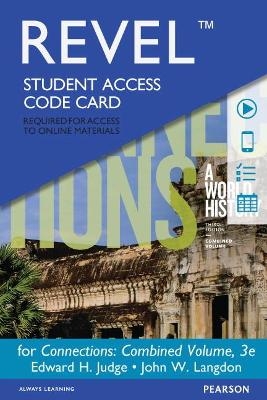
Connections
Pearson (Hersteller)
978-0-13-394036-7 (ISBN)
- Titel erscheint in neuer Auflage
- Artikel merken
REVEL is Pearson’s newest way of delivering our respected content. Fully digital and highly engaging, REVEL offers an immersive learning experience designed for the way today's students read, think, and learn. Enlivening course content with media interactives and assessments, REVEL empowers educators to increase engagement with the course, and to better connect with students.
NOTE: REVEL is a fully digital delivery of Pearson content. This ISBN is for the standalone REVEL access card. In addition to this access card, you will need a course invite link, provided by your instructor, to register for and use REVEL.
Edward H. Judge and John W. Langdon are professors of history at Le Moyne College, where they have team-taught for the last 20 years a two-semester world history course for first-year students as well as courses on modern global history for upper-level students. Judge earned his doctorate at the University of Michigan and spent a year in the USSR as an IREX scholar. He has taught at Le Moyne since 1978, was the college's scholar of the year in 1994 and was awarded the J. C. Georg Endowed Professorship in 1997. Langdon earned his doctorate at Syracuse University's Maxwell School of Public Affairs, where he was a national defense fellow. He has taught at Le Moyne since 1971, directed its honors program and was awarded the O'Connell Distinguished Teaching Professorship in 1996. Each has been named the college's teacher of the year and has chaired its department of history. They have written or edited eight books: three in collaboration with each other, three as individuals and two in collaboration with other scholars. They love teaching world history, especially to students of diverse backgrounds and interests, and they derive great joy from infecting their students with a passion and enthusiasm for the study of the human past.
Era One: Emergence and Expansion of Regional Society, to 300 C.E.
1. The Emergence of Human Societies, to 3000 B.C.E.
2. Early Societies of West Asia and North Africa, to 500 B.C.E.
3. Societies and Beliefs of Early India, to 550 C.E.
4. The Origins of the Chinese Empire, to 220 C.E.
5. Early American Societies: Connection and Isolation, 20,000 B.C.E.-1500 C.E.
6. The Persian Connection: Its Impact and Influences, 2000 B.C.E.-637 C.E.
7. Greek Civilization and Its Expansion Into Asia, 2000-30 B.C.E.
8. The Romans Connect the Mediterranean World, 753 B.C.E-284 C.E.
Era Two: Transregional Conflicts and Religious Connections
9. Germanic Societies and the Emergence of the Christian West, 100-1100 C.E.
10. The Byzantine World, 284-1240
11. The Origins and Expansion of Islam, 100-750
12. Religion and Diversity in the Transformation of Southern Asia, 711-1400
13. Early African Societies, 1500 B.C.E.-1500 C.E.
14. The Evolution and Expansion of East Asian Societies, 220-1240 C.E.
Era Three: Cross-Cultural Conflicts and Commercial Connections, 1000-1650
15. Nomadic Conquests and Eurasian Connections, 1000-1400
16. The Resurgence of the Christian West, 1050-1530
17. Culture and Conflict in the Great Islamic Empires, 1071-1707
18. The Aztec and Inca Empires, 1300-1550
19. Global Exploration and Global Empires, 1400-1700
20. The West in an Age of Religious Conflict and Global Expansion, 1500-1650
Era Four: The Shift from Regional to Global Connections, 1500-1800
21. The Search for Stability in East Asia, 1300-1800
22. Southern Asia and the Global Shift in Wealth and Power, 1500-1800
23. Africa and the Atlantic Slave Trade, 1400-1800
24. Absolutism and Enlightenment in Europe, 1600-1763
25. Russia’s Eurasian Empire: Convergence of East and West, 1300-1800
Era Five: Revolution, Industry, Ideology, and Empire, 1750-1914
26. The North Atlantic Revolutions, 1750—1830
27. Industry, Ideology, and Their Global Impact, 1700—1914
28. Nation Building in the Americas, 1789—1914
29. New Connections and Challenges in Eastern and Southern Asia, 1800—1912
30. New Connections and Challenges in West Asia and Africa, 1800—1914
Era Six: Global Upheavals and Global Integration, 1900-Present
31. The Great War and the Russian Revolutions, 1890—1918
32. Anxieties and Ideologies of the Interwar Years, 1918—1939
33. World War II and the Holocaust, 1933—1945
34. East Versus West: Cold War and Its Global Impact, 1945-Present
35. The Upheavals of Asia, 1945—Present
36. Reform and Revolution in Latin America, 1914—Present
37. Postcolonial Challenges in Africa and the Middle East, 1939—Present
| Sprache | englisch |
|---|---|
| Maße | 216 x 279 mm |
| Gewicht | 14 g |
| Themenwelt | Geisteswissenschaften ► Geschichte ► Allgemeine Geschichte |
| ISBN-10 | 0-13-394036-5 / 0133940365 |
| ISBN-13 | 978-0-13-394036-7 / 9780133940367 |
| Zustand | Neuware |
| Haben Sie eine Frage zum Produkt? |
